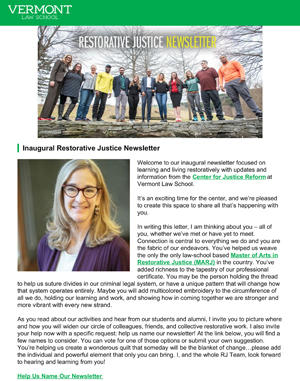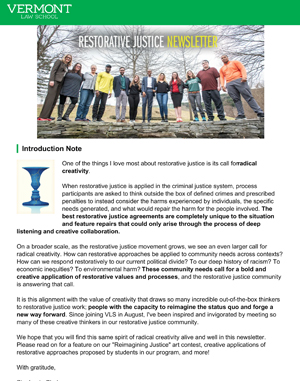The American Bar Association awarded its 2015 Environment, Energy, and Resources Dedication to Diversity and Justice Award to Professor Benjamin Sovacool, a senior fellow at the Institute for Energy and the Environment (IEE) at Vermont Law School, during its annual meeting Aug. 2 in Chicago.
The ABA recognized Sovacool for his commitment to environmental and energy justice, specifically in the areas of energy poverty, the theory and practice of energy justice, and the promotion of diversity and social science in energy research.
"Benjamin's scholarship is exceptional, and his influence in the field of environmental and energy justice is far-reaching," said IEE Director Michael Dworkin, who accepted the award on Sovacool's behalf. "He has expanded our students'—and our profession's—awareness of the need and tools for rigorous analysis of the meaning of justice as we struggle to find environmentally sustainable ways of meeting energy needs in a world where billions go unserved or underserved. Current paths of service impose unjust and unsustainable burdens on those with the fewest of choices."
In 2011 Sovacool founded the IEE's Energy Justice and Security Program, which investigates how to provide ethical access to energy services and minimize the injustice of current patterns of energy production and use. Sovacool and participating students explore how to equitably provide affordable, reliable, efficient, environmentally benign, proactively governed and socially responsible energy services to households and consumers.
In his classes and research, Sovacool opens up questions of justice across a broad range of energy issues. His books are often cited and positively reviewed. His most recent book, "Global Energy Justice" (Cambridge University Press, 2014), co-authored with Dworkin, asks how philosophers of justice would approach eight real-world decisions about energy needs, a topical question for judges and regulators applying statutes that call for just and reasonable results.
"I congratulate Benjamin on this ABA award in recognition of his commitment to energy justice, and can think of no one more deserving of the honor," said VLS President and Dean Marc Mihaly. "Not only are his research and scholarly accomplishments impressive, but he's also a model in service. As a mentor, he gives generously of his time and is sought after by our students. And as a volunteer, he serves tirelessly on panels and review boards for global change-makers, from the World Bank to the Intergovernmental Panel on Climate Change. Benjamin's work has made major contributions to the fields and values of our environmental faculty."
The Institute for Energy and the Environment at Vermont Law School provides accessible resources on contemporary energy law and policy and is modeled on the fundamentals of a successful public policy consulting firm. The IEE distributes scholarly, technical and practical publications; provides forums and conferences for professional education and issue development; and serves as a center for graduate research on energy issues, with environmental awareness. IEE research associates are selected from top students in the nationally recognized energy and environmental programs at VLS. The energy program offers a Master of Energy Regulation and Law (MERL) degree, energy law concentrations within the juris doctor program, and a Master of Laws (LLM) in Energy Law for current lawyers. For more information about the Institute for Energy and the Environment, visit vermontlaw.edu/iee, email jthomas@vermontlaw.edu, or call 802-831-1151.
###
Vermont Law School, a private, independent institution, is home to the nation's largest and deepest environmental law program. VLS offers a Juris Doctor curriculum that emphasizes public service; three Master's Degrees—Master of Environmental Law and Policy, Master of Energy Regulation and Law, and Master of Food and Agriculture Law and Policy; and four post-JD degrees —LLM in American Legal Studies (for foreign-trained lawyers), LLM in Energy Law, LLM in Environmental Law, and LLM in Food and Agriculture Law. The school features innovative experiential programs and is home to the Environmental Law Center, South Royalton Legal Clinic, Environmental and Natural Resources Law Clinic, Energy Clinic, and Food and Agriculture Clinic. For more information, visit www.vermontlaw.edu, find us on Facebook, and follow us on Twitter.


















